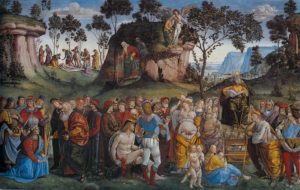Thoughts on Sunday’s Lessons for Feb. 16, 2020
First Reading: Deuteronomy 30:15-20
As we live through the Epiphany season, waning winter’s days are growing longer and the slant of noonday light perceptibly rises. Lent may lie just ahead, but Spring is drawing near.

Moses’s Testament and Death (1481-1482), oil painting on fresco by Luca Signorelli (1450-1523). The Sistine Chapel, Vatican City. (Click image to enlarge.)
In Sunday’s first reading the people have reached the banks of the Jordan after 40 years wandering in the desert. As they prepare to cross into the promised land, Moses preaches the core of Old Testament teaching: Follow God’s commandments, and you will inherit the land. Defy God’s wishes, and you will lose the land and die. From Sinai to the Jordan, he people have repeatedly heard this covenant: Be righteous, be just. Care for the poor and the weak; the widow, the orphan and the stranger. And when the people fail, the prophets will rise up to remind them of God’s promise, which will play out in the loss of the land, the destruction of the Temple, and exile.
Alternate First Reading: Sirach 15:15-20
We rarely hear readings from Sirach, one of the books known as Apocrypha that come at the end of the Old Testament. Called “The Wisdom of Jesus, ben Sirach” in the original Greek, Sirach was renamed Ecclesiasticus in Latin after the Emperor Constantine accepted Christianity as the state religion. Sirach is in the genre of wisdom literature: brisk, memorable advice akin to the Book of Proverbs. Sunday’s alternate first reading reminds us that we are given free will. God does not force us to keep God’s commandments – we may choose either fire or water – but God is all-knowing and wise and does not wish us to sin.
Psalm: Psalm 119:1-8
Today we hear only the first eight of the 176 verses that make up this, the longest of the Psalms. This introductory passage introduces us to the long psalm’s message: Torah, God’s teaching, is so wonderful that it inspires us to love it and follow it as law. Those who follow that teaching and walk in God’s ways will be rewarded. In chanting this psalm we pray that God will keep us steadfast in following this teaching, these laws.
Second Reading: 1 Corinthians 3:1-9
Paul continues making his case to the quarreling factions that have formed in his little church at Corinth. Last week’s passage might have given the impression that Paul was praising the Corinthians for a spiritual maturity that enabled them to understand the ways of God. But no! Paul makes it clear in the verses we read Sunday that the Christians of Corinth still have a long way to go. Their quarreling factions, he warns, show that they are like babies not yet weaned from milk, utterly unready for spiritual food. When we work together as God’s servants, he adds, God uses us to build and grow in common purpose.
Gospel: Matthew 5:21-37
The Sermon on the Mount takes up three full chapters in Matthew’s Gospel, and in this, our third Gospel drawn from it, we are still in the first of the three! In last Sunday’s portion we heard Jesus say that he did not come to change the Law and the Prophets (the literal translation for the Tanakh or Hebrew Bible). Now, however, he begins interpreting the law as the Talmudic scholars did, reading it in new, radical, and challenging ways. It’s not just “Do not kill” but do no harm of any kind; we must even respond to our enemies in peace! Do not commit adultery? Not just that, but treat women with respect! Do not bear false witness? No, do more: Be honest, be true, say exactly what you mean!
